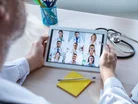5G Technology is Revolutionising Healthcare Delivery

Technological advancements are continually reshaping the way health providers approach patient care. Among these innovations, the emergence of fifth-generation mobile networks, or 5G, has the potential to redefine healthcare delivery.
The global 5G healthcare was estimated to be worth US$215m in 2021, and is set to reach US$3,667m by 2026 – growth of 76%. Increasing adoption of telehealth and robotic surgery – and greater use of 5G-enabled wearable medical devices for real-time remote patient monitoring – are driving the growth of this market.
Other factors driving growth are the ability of 5G technology to quickly transmit large volumes of patient data, advancements in telecoms tech and the availability of low-cost sensors.
5G unleashes the power of telemedicine
At the heart of the 5G revolution is telemedicine, which saw huge growth during the global pandemic. With 5G's ultra-fast speeds and low latency, healthcare practitioners were able to conduct virtual consultations with patients in real-time, ensuring access to care from virtually anywhere. This is not only convenient, but also reduces workloads for overburdened healthcare systems.
Remote patient-monitoring is also becoming more commonplace. Networked wearable devices and medical sensors – all of which are 5G enabled – offer continuous and real-time monitoring of patients' vital signs and of disease progression.
This approach to healthcare management allows for early detection of complications, as well as personalised treatment plans and improved patient outcomes, particularly for those with chronic conditions.
In Malaysia, for example, the government is exploring digital health solutions for Malaysians.
Communications Minister Fahmi Fadzil unveiled the CelcomDigi Digital Healthcare Solution. This helps primary care providers, such as clinics and pharmacies, to choose the connectivity – mobile or fibre – that best suits them, and then helps them plumb-in their choice of digital healthcare solution.
Like many nations, Malaysia has an obesity problem, and chronic diseases such as diabetes and hypertension are becoming more common. This means there is an acute need for innovative healthcare solutions to ease the strain on public healthcare services.
Malaysia’s private tertiary hospital, the Subang Jaya Medical Centre, recently launched the country’s first connected health service, called Connected Care. The 400-bed hospital is a joint venture, run by Ramsay Health Care Australia and Sime Darby Malaysia.
The solution will eventually be offered across six areas of care, with the first being a telemedicine service for medical inquiries and appointments, and a remote monitoring service for elderly patients.
"We want to shift from serving patients to serving people, from delivering healthcare to delivering health, and from hospital to home,” Subang Jaya CEO Bryan Lin says. “Connected Care is transforming healthcare delivery, empowering patients through seamless access to professional and affordable care in the comfort of their own homes.”
5G fast and reliable for healthcare
The speed and reliability of 5G is key here. It is able to rapidly transmit large medical-imaging files, such as MRI scans and X-rays, allowing healthcare professionals to make timely and accurate diagnoses. Plus, real-time data sharing and collaboration among multidisciplinary teams allows for personalised care delivery.
The technology also opens up new treatment possibilities, including remote surgeries, and in-theatre use cases include harnessing the power of robotics and real-time communication networks.
5G cost and time savings for healthcare providers
Cost savings are another factor with 5G. Telecoms company Vodafone UK recently published a study that 5G technology could lead to savings of around £1 billion a year for the UK NHS – equivalent to 15,400 full-time nursing posts.
Vodafone’s modelling factors-in the benefits of remote patient monitoring, freeing patients and healthcare practitioners from face-to-face care delivery, and freeing up beds for those most in need.
A Vodaphone poll of 500 NHS nurses shows two-thirds (64%) say they're keen to learn more about digital transformation, and are excited about the role technology can play in improving the NHS. Nearly half (46%) are optimistic about the potential of technology to transform their day-to-day work.
Digital-engagement levels high among nurses
The survey also shows nurses have a high level of digital engagement and understanding, with 71% saying they have a good or excellent understanding of 5G, compared to 38% of the general public.
Anne-Marie Vine-Lott, Director of Health at Vodafone UK, says: “Nurses are some of the biggest advocates and adopters for the use of technology in healthcare and are highly engaged in the NHS’s use of digital technologies.
“Like us, they recognise how technologies like 5G can unlock huge benefits for patients and the NHS workforce – so now’s the time to listen to them and act.”
******
Make sure you check out the latest industry news and insights at Healthcare Digital and also sign up to our global conference series - Tech & AI LIVE 2024
******
Healthcare Digital is a BizClik brand
- Virginie Helias: How P&G Champions Healthcare SustainabilitySustainability
- AstraZeneca CSO Pam Cheng: Health Equity & SustainabilitySustainability
- McKinsey, GSK & Novo Nordisk: This Week in HealthcareTechnology & AI
- How Cardinal Health Creates Sustainable Supply ChainsMedical Devices & Pharma



